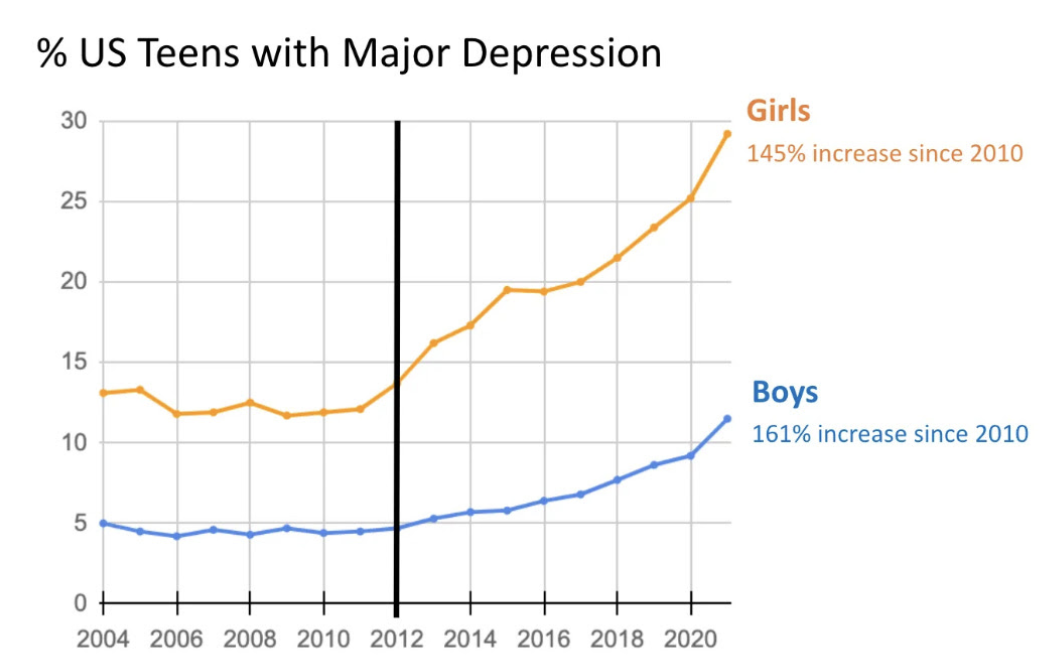Children
We work with parents to give their children a strong foundation. Society and institutions are failing. It’s time to adapt to the future, rather than the past. For more, read David’s essay on the future of education.
The facts on teens
It is now widely accepted that an epidemic of mental illness began among American teens in the early 2010s.
The onset of puberty in the US is now 12 and a half years, and 10 percent of girls are now starting before age 11.
Depression among teen girls is up 145 percent in the last ten years.
There is a 48 percent increase in self harm and an 82 percent increase in successful teen suicides. Suicides are more prevalent during the school year, and more often occur on school days.
Students who felt close to persons at school had a significantly lower prevalence of poor mental health (vs those who did not have close ties):
persistent feelings of sadness or hopelessness (35.4% versus 52.9%)
having seriously considered attempting suicide (14.0% versus 25.6%)
having attempted suicide (5.8% versus 11.9%).
A recent Yale study discovered that 75% of teens are unhappy in high school.
NSDUH data, see section 1.1.2 of the Adolescent mood disorders collaborative review doc.
The way out
Goals, community, and purpose are prophylactics against adolescent dysfunction. While it’s impossible to imagine forbidding girls from using social media, it’s very important that they understand how devastating it is on most girls’ self esteem. This is an urgent issue that can’t be swept under the rug. To be able to use social media, they should understand the risks and be active participants in creating their own solutions.
Kids need goals. Some children have intrinsic motivation, yet most don’t. There is a spectrum of self awareness and motivation. Each child needs his/her own approach. They won’t work toward goals they don’t set themselves.
This is an ongoing conversation with your child. Beyond video gaming and scrolling, all kids have some intrinsic interests. We believe we can help most children develop their interests into passions and connect them to goals. We will find specialists, teachers, coaches, and role models for your kids to learn from. We will help them find groups and communities of like-minded teens.
We will give your kids their own Notion dashboard, set up a money system, and start teaching them to manage their own digital lives. We’ll even hire them to work for us cataloging your assets. We want to keep them working on projects and have things to look forward to.
We set up a money system, so kids have to make trade-off choices between things they want and the money they have. They can also earn money if they want to. You can use a money system for many things, including resolving arguments with bets, making predictions, and doing deals.
Learning a new language is a fantastic investment for kids. The younger they are, the quicker they learn. We can set up kids with programs, schedules, other kids to meet online, and communities where they can practice. As soon as possible, kids should take a trip to the place where their chosen language is spoken.
We ask kids to do research and make presentations on what they have learned. This is outside of school but can be part of the school year or a vacation. For summer, we want kids to have a serious project they study and prepare for, and we’ll have an end-of-summer presentation day for all kids in our community to show what they have learned.
We ask families to create some big goals they do together. They should be hard. They should require plenty of preparation and step-by-step execution. There should be some degree of risk of failure, because not all projects go perfectly. We invite you to learn about our upcoming trip to climb Mt Kilimanjaro and go on safari to see African animals and the mountain gorillas in Uganda. We can also work with you to create something similar that would be difficult and meaningful for your family. This is a great way to get out of the grind of a divorce or any other chronic situation.
Give kids responsibility. Have them plan the trip. Have them plan a weekend driving trip or a quick trip to a theme park. Have them plan dinner or a party. Have them work for money.
Get kids to help others. Mark Zuckerberg asks his girls when they come home from school: “Who did you help today?” That’s something money doesn’t buy. How can we set up your kids to help others on a regular basis? Let’s put something together and give them a good reason to show up.
Stoicism. We teach all our clients Stoicism, and children are often quicker to embrace the concepts than their parents. We will send them daily reminders and videos and interesting things to watch, to pique their curiosity and spark discussions. We plan to use a common chat room like Slack so all our clients’ kids can learn from each other, plan and do projects together.
Science. We believe in STEM that goes far beyond school. The core of any STEM curriculum should be critical thinking, Bayesian reasoning, and decision science. We teach these topics one-on-one, in a group setting, and we also send out daily reminders and media for kids to consume. At any age, kids can learn much more advanced science topics than their schools and teachers are willing to give them.
Sex education. This isn’t for all families, but we believe that sex education — if done appropriately and at the right time — pays big dividends later. This is for boys and girls who are going through or have gone through puberty. They need to learn the basic biology and physiology, as well as the psychology and social aspects. We won’t give the statistics here, but there are several trends leading in the wrong direction for girls and boys in this area. Kids know what they learn online and from friends. They need better information. They need guides and people they can go to with their questions. Most kids won’t talk 100 percent openly with parents about this. Most schools don’t do a good enough job on this. We want to design a learning environment for your children to learn safely and appropriately. It can have huge consequences later.
Give us a call to discuss your kids and your situation. We want to help.


